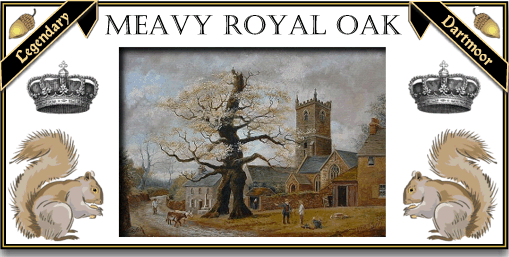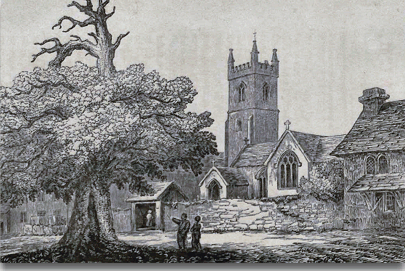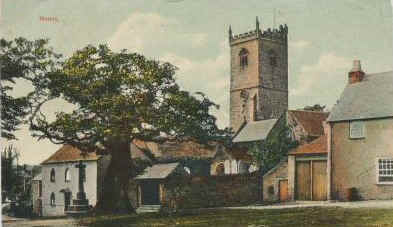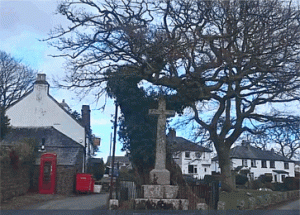
An old miner called Sam Gaskett once lived in the small village of Meavy on Southern Dartmoor. All his working life had been spent at the mines and although there was never a constant demand for work he enjoyed the job.
The miners were paid by the quality of the ore and the amounts mined and sadly most of the large lodes had been worked out so this meant Sam’s wages were very low. There was just enough money to provide the necessities of life for he and his wife. Despite this they both lived in the belief that one day their fortunes would change for the better.
One cold winters night Sam was sat on his little stool infront of the peat fire. They had put some ‘pluffy turves’ (peat turves that are not as compact as normal and so burn faster) on the fire and the old miner was staring into the bluey orange flickering flame. His wife was sat opposite in the old rocking chair darning an almost un-repairable pair of socks. Sam picked up the poker and started prodding the fire, “they old men ‘ave a clained out the workin’s” Sam said. “E’m ant lef much ore vur us, I be certan I shull ‘ave tu shift on zoon if things dawn’t git better, but where kin I go, that’s the rub?” His wife looked up and smiled sweetly, “dun ee fret, it can’t always be like this, things u’ll improve e’ll zee”. Sam sighed and slowly nodded his head, “I knaw, but it better way cum zoon I be down tu me last penny an’ tis a fretful state tu be in, but ee’s right ten no gud lookin’ on the black side of things, us’ll see how tis by-m-by.”
It was now getting dark so Sam stood up and lifted down the old lantern, he took a spill from the brass rack hanging beside the fire and lit the candle. The room took on a warm orange glow, “Better way fetch a bit more turve fur tis too late, I forgot tu zee to ‘t when I comed home.” With that he put on his jacket and went out into the cold night. Sam’s cottage was a humble affair and did not have the luxury of an outhouse so this meant he used to store his peat in the hollow trunk of the big oak that sat nearby on the village green. He had heard the old folk say that the oak was hundreds of years old which judging by its size he was not surprised. The hollow trunk was ideal for keeping his peat dry and could hold a fair sized stack.
By the light of his lantern Sam made his way across to the tree and began filling his basket with the peat. Some of the turves had fallen out of the stack and onto the floor, “blinging kids, em ‘ave bin a playing in the stack agin,” he muttered as he bent down to pick up the stray peat bricks. Whilst groping around on the floor his fingers touched something soft and heavy and on picking it up he could see that he had found a leather purse. He looked around to see if there was anybody around and stuffed the purse into his pocket. Sam heaved up the peat basket and excitedly scurried off back to the cottage. Once inside he bolted the door and threw down the basket, “zee ‘ere mother, look what I found in the peat stack.” He held the purse in his huge hand and proffered it to his wife, “us’ll be alright now jest as ee said, our luck ‘as improved mother.” Sam opened the purse and tipped out a handful of shiny gold coins, “Guineas mother, guineas, us be rich now mother, rich”. His wife slowly shook her head, “no Sam us be no richer an afore, the coin dun belong tu us, in the marnin ee mus find the owner,” she replied. Sam sighed, he knew she was right and so in the morning he would ask around to see if anybody had lost the purse.
The old miner kept his word and the next day he asked everyone he met if they or anybody they knew had lost anything by the oak tree. Nobody came to mind and Sam thought that it must have been a stranger because there was not a soul in the village who could possibly have that much coin to their name. After a week the old miner had been unable to trace the owner and so he and his wife agreed to put the purse in the drawn until the owner came to claim it and until that day they would think no more about it.
The following week Sam came home from work in a frenzy, he sat his wife down at the table and explained that the mine captain had offered him the position of ‘overman’ which meant his wages would be doubled and even better they would be regular. The only doubt in his mind was that he was not “skollard ‘nough” for the job. He had left school when he was 10 years of age and could hardly read, he certainly could not write and although the new position did not call for a lot of paperwork there would be some writing involved. As ever his wife came up with the solution, “you u’ll ‘ave tu go bak tu school Sam, John Gregory u’ll teech ee at night, ee be a fine school maister and twill be no prablem fur sure.” Sam was none too happy about the prospect but he knew deep down that in order to keep his new job it was something that had top be done. So the next few months saw Sam sitting at a little desk in the schoolroom learning how to write. He was pleasantly surprised how easy it was and soon graduated with honours.
Life is always full of up’s and down’s and Sam’s was no different because come the winter the lodes at the mine had been worked out and until some more were found the miners were laid off. Luckily Sam had managed to save a bit of ‘rainy day’ coin and they had enough money to last a few weeks but then that was it.
Once again as they sat around the old peat fire Sam announced that they were down to their last penny. He got up and went to the old dresser where he slowly pulled out the top draw. “tis bin months now an’ nobody ‘as claimed the coin, I think tis time to use the coin, mother, time is right enough,” he said. His wife sat in the rocker and nodded, “perhaps you’m right Sam, but fust ee ‘ave another try at findin’ the owner and then if ee can’t us’ll use some of the coin.”
No sooner had they made this decision than there was a loud knock at the front door, Sam got up from the fire and lifted the latch. A tall gentleman stood in the porch and it was clear from his dress that he was a travelling gent. “Is this the correct road for Tavistock,” he asked. Sam nodded and pointed up the road, “‘es zur, if ee gaws up thik rawd and ‘eads fur Dousland ee can’t go wrong”. The gent bowed his head and turned to go, he then looked back and asked “they call this place Meavy don’t they?” Sam nodded, “um do zur, um do.” The stranger said, “I thought so, the last time I passed through here I lost my purse, it was raining heavily and I took shelter in the hollow of that old oak tree, when the storm had cleared I travelled on to Plymouth and found that I had mislead my coin.” Sam hesitated but could see the look on his wife’s face, “lost yer purse zur, well I must tell ee zur, I found ‘n.” The traveller was taken aback, “tell me my man, when did you find it”. Sam scratched his head, “well zur, let I zee, ’twas ‘fore I went tu school, zur”. The gent angrily interrupted him, “before you went to school! What good is that to me, if you found my purse before you went to school you are welcome to keep it and its contents because I was but a child when you went to school.” With this the gent strode back to his mount and rode off.
Sam slowly closed the door and crossed over to his stool, “there ee be mother, you’m heard ‘n, I kin keep the purse and the coin, us’ll be alright now mother, no more worries.”
The splendid old oak tree still stands on the village green as it has stood for centuries. In 1834 messers G and J Hearder wrote the following:
“Immediately in front of the church-yard wall is the gigantic Meavy Oak. This venerable tree, though it has suffered from the touch of age, still continues proudly magnificent. It is of an extraordinary circumference, and is completely hollowed out by the slow but never-failing operations of time. The cavity, as is affirmed by mine hostess of the “Royal Oak,” a little inn standing hard by, once accommodated nine persons at a dinner party: it is now used as a turf house. The lower branches still obey the voice of spring, and spread their living canopy over a large area of ground. The topmost boughs, however, are bare, having long ceased to be hung with the massive foliage which they bore in the days of their young lustihood...”

The Meavy Oak
Burnard 1986, p.e34 considers that local tradition has it that the tree was planted in the reign of King John (1166 – 1216). Hemery, 1999, pp 47 – 50, considers that the estimated that the age of the tree is probably around 960 years old and possibly older. She also quotes Sabine Bearing Gould as saying:
“The Meavy Oak is referred to in deeds almost to the conquest, and that it was a sacred tree to which certain amount of reverence was given is probable enough. The cross was set up under its shadow to consecrate it and probably put an end to superstitious rites done there. Anyhow this tree till within this century (1800’s) was, on the village festival, surrounded with poles, a platform was erected above the tree, the top of which was kept clipped flat like a table, and a set of stairs erected, by means of which the platform could be reached. On the top a table and chairs were set and feasting took place. Whether dancing I cannot say, but in all probability in former generations there was dancing there as well as feeding and drinking. These threes where dancing took place are precisely the Maypole in a primitive form.”
Hemery also notes that in a book held at the Bodleian Library in Oxford there are claims that “the Royal Oak at Meavy, Devon was traditionally said to be known to King John and his followers in the chase”. The oak is also said to be the fourth largest oak tree in Devon. It is a fact that it was at one time used as a peat store but by the publican of the nearby Royal Oak inn. There are also modern day stories of people riding their bikes through the gap in the trunk. It is also possible that the tree was a gospel oak where early preachers would come and conduct services under the shelter of its branches. It is clear that the village cross which is probably fifteenth century, was sited under its shade and it too may have been a preaching cross. Another tradition at Meavy is the annual Oak Fair, this dates back many years and has been held on the green by the old oak tree. There is also a tradition that this oak was one of the many that King Charles was said to have hidden in, hence the name Royal Oak.

Meavy Oak, Green Cross and Church
Although the mighty oak has battled on down through the centuries 2019 was a crisis point. A tree survey was taken in the January of 2019 and reported that it was in a; “very advanced stage of decline and if left untouched would prove a major safety risk to people or cars parked near to the tree.” It was recommended that prompt works be carried out before mid-March. It was suggested that two large secondary branches be reduced and to lighten the overhead canopy. This action would then reduce the weight which the hollow and decayed main trunk had to bear. In addition it was suggested that the thick cloak of ivy be removed and possibly to add further support props.

The main mining concern in the Meavy area during the 1830’s was the Yennadon Iron Mine Here the ore was both open cast mined and dug for the ground. The main lode at the surface was about 4m wide and went down to a similar depth. The main adit is said to have been 60 fathoms deep (120m). There were also tin mines at Brisworthy Burrows and Greenwell Gert, Hemery pp 117 -119.
Bibliography.
Burnard, R. 1987 Dartmoor Pictorial Records, Devon Books, Newton Abbot.
Hemery, P. 1999 The Book of Meavy, Halsgrove, Tiverton.
 Legendary Dartmoor The many aspects past and present of Dartmoor
Legendary Dartmoor The many aspects past and present of Dartmoor

One comment
Pingback: “Freshly cut Christmas trees smelling of stars and snow and pine resin—inhale deeply and fill your soul with wintry night.” John Geddes – GREETINGS FROM THE DRAGON LAIR DIVA